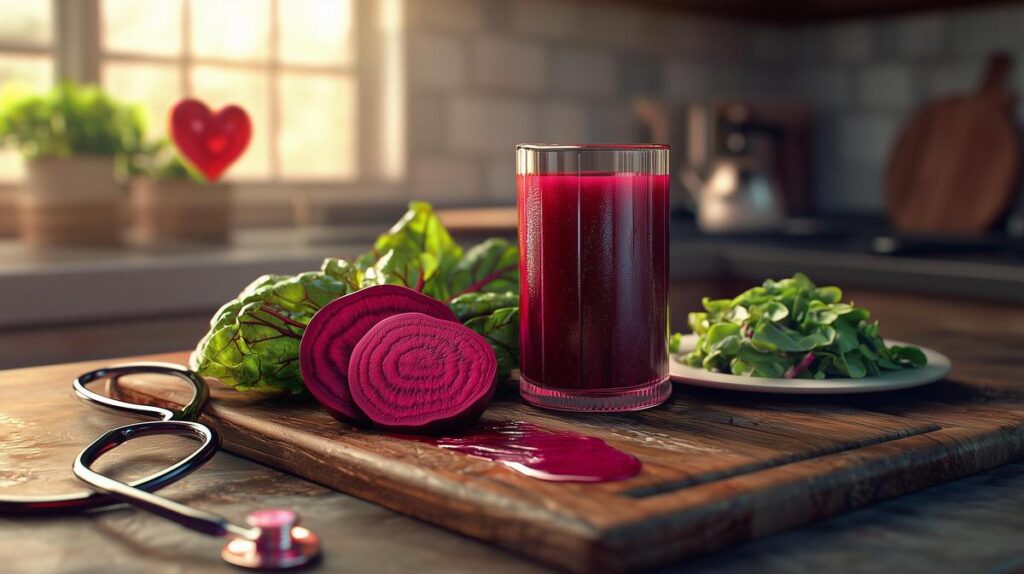TL;DR:
- Heart Health: Beetroot lowers blood pressure via nitrates converted to nitric oxide, improving blood flow. Antioxidants like betalains protect cells from free radicals.
- Nutrients: Rich in folate, potassium, fiber, and nitrates—it aids red blood cell production, balances sodium, lowers LDL cholesterol, and enhances circulation.
- Exercise & Oxygen: Boosts oxygen delivery to muscles, improving stamina and reducing fatigue during workouts, particularly with beet juice consumed 2-3 hours beforehand.
- Anti-Inflammatory: Betalains reduce vessel inflammation, preventing arterial stiffness and cardiovascular issues.
- Risks: Overeating may cause beeturia (red urine), kidney stone risk (oxalates), or methemoglobinemia (high nitrates). Moderate intake is key.
- Versatile Food: Enjoy roasted, juiced, or raw. Beet greens are edible and nutrient-dense.
- Evidence: Studies confirm benefits for blood pressure, circulation, oxygen use, and inflammation reduction.
Beetroot is more than a vibrant root vegetable—it could be your heart’s best friend. Packed with nutrients and natural compounds, beetroot has gained attention for its potential to lower blood pressure, improve circulation, and support overall heart health. But is this buzz backed by science? In this post, I’ll break down how beetroot works to keep your heart strong, boost performance, and fit effortlessly into your diet. Let’s dig in!
What Are the Heart-Health Benefits of Beetroot?
Beetroot is a powerhouse when it comes to heart health. One key benefit is that it helps lower blood pressure. But how? Beetroot is packed with nitrates, which your body turns into nitric oxide. Nitric oxide relaxes and widens blood vessels, letting blood flow more easily. This process lowers blood pressure, reducing strain on your heart.
Another reason beetroot helps the heart is its antioxidants. These compounds fight harmful molecules called free radicals. Without antioxidants, free radicals can damage cells, including those in your heart. Beetroot’s antioxidants, like betalains, repair this damage and keep your heart’s cells healthy.
You might wonder, why is beetroot considered one of the best heart-friendly foods? The answer lies in its mix of nutrients and low calorie count. A half-cup of boiled beetroot provides folate, potassium, and fiber—all of which support heart health. Folate helps produce red blood cells, which carry oxygen. Potassium balances sodium levels, keeping blood pressure in check. Fiber improves cholesterol levels, another big factor in heart health.
Beetroot is also versatile, fitting into almost any diet. Whether you eat it roasted, boiled, raw, or even as juice, it delivers its heart-protecting power. Experts agree that it’s one of the top heart-healthy foods you can add to your plate.
For more details on beetroot’s benefits, you can check this American Heart Association resource.
How Does Beetroot Improve Blood Circulation?
Beetroot is one of the most effective foods to improve blood flow. Its power comes from natural nitrates, which your body converts into nitric oxide. This compound relaxes blood vessels, letting blood flow more easily. As a result, it helps your body deliver oxygen and nutrients efficiently, which supports both heart and muscle function.
But what makes beetroot so special in this regard? The high nitrate content is the main factor. Nitrates in beetroot increase nitric oxide in the bloodstream, which reduces blood pressure and enhances circulation. Research has shown that nitric oxide also improves vascular health by keeping blood vessels flexible and healthy. This means your arteries are less likely to stiffen, a condition linked to heart disease.
Beetroot contains additional compounds that also support blood flow. For instance, antioxidants in beetroot fight cell damage caused by free radicals. Damaged cells can make blood flow less efficient, so antioxidants protect your vascular system indirectly. Beets are also rich in folate, a type of B vitamin that helps regulate blood homocysteine levels. High homocysteine is associated with poor circulation and heart problems.
When comparing beetroot to other foods that improve blood flow, few match its unique combination of nitrates, antioxidants, and vitamins. Studies, like this one, link beet consumption to measurable improvements in circulation and heart health. These benefits make beets a standout choice for anyone looking to support better blood flow naturally.
By eating beetroot in salads, juices, or cooked dishes, you give your body multiple tools to keep your blood moving smoothly. This nutritional boost is simple, effective, and backed by science.
Can Beetroot Help in Managing Blood Pressure Naturally?
Yes, beetroot can help manage blood pressure naturally. Studies show that it may lower blood pressure due to its high nitrate content. Nitrates in beetroot turn into nitric oxide in your body, which helps relax and widen blood vessels. This process reduces the pressure inside arteries, improving blood flow and decreasing hypertension.
Dietary nitrates are key players in this effect. These are naturally found in nitrate-rich foods like beetroot, spinach, and arugula. Once in your body, friendly bacteria in your mouth convert nitrates into nitrites. The nitrites then transform into nitric oxide, which supports vascular health by relaxing blood vessel walls. This chain reaction makes nitrates effective for reducing blood pressure levels.
But, are there studies to back this up? Yes, several exist. For instance, researchers have found that drinking beetroot juice can reduce systolic and diastolic blood pressure, particularly in people with high blood pressure. According to this report, a glass of beetroot juice daily significantly reduced blood pressure in participants within hours. These findings suggest a promising role for beetroot as part of a natural approach to blood pressure management.
Eating whole beets provides additional nutrients like fiber and antioxidants. However, beetroot juice offers concentrated nitrates, which might make it more effective for quicker results. Both options support heart health, allowing you to enjoy variety while managing blood pressure. Regular intake, along with a balanced diet, may lower hypertension risks long-term, offering a natural way to support your heart.
Does Beetroot Support Oxygen Utilization During Exercise?
Yes, beetroot can enhance oxygen utilization when you exercise. It contains high levels of dietary nitrates, which the body converts into nitric oxide. Nitric oxide plays a key role in relaxing blood vessels and improving blood flow. This process allows your muscles to receive more oxygen during activities like running or cycling, boosting performance and reducing fatigue.
Drinking beet juice before a workout may help you exercise longer and with less effort. Studies show that consuming beet juice improves endurance by lowering the oxygen your body needs during physical activity. This makes it easier for your muscles to perform. Because of these effects, beet juice is often used by athletes.
You might wonder why beets and exercise performance are connected. It comes down to how efficiently your body uses oxygen. The nitrates in beets lower the cost of oxygen during movement. This means your muscles work harder without needing as much oxygen as usual. Elite athletes often use beetroot for this edge, but even casual exercisers notice benefits.
Eating or drinking beetroot regularly can help your fitness goals. Whether you’re lifting weights or going for a jog, including beet juice before a workout might give you noticeable results. Still, timing is important. Research suggests consuming beetroot products two to three hours before exercise ensures your body processes the nitrates fully.
For additional details on how beetroot supports exercise and circulation, you can explore this resource.

How Do Nitrates in Beetroot Boost Cardiovascular Health?
Nitrates in beetroot are natural compounds that spark amazing changes in the body. When eaten, nitrates are turned into nitrites by bacteria in your mouth. This process continues in the stomach, and nitrites are converted into nitric oxide. Nitric oxide is a molecule that helps relax and widen blood vessels, which improves blood flow and circulation.
Better blood flow directly benefits your heart health. Nitric oxide from nitrate metabolism supports endothelial function. The endothelium is the thin lining inside blood vessels that controls their ability to expand and contract. Healthy endothelial function keeps blood pressure low and prevents the arteries from stiffening over time. This reduced stiffness supports better heart performance and lowers the risk of cardiovascular diseases.
Scientific studies back up these benefits. Research published in this paper shows that dietary nitrates from beets can significantly lower blood pressure levels. Another study found that daily beetroot juice improved endurance in physical activities by enhancing oxygen uptake. Both findings highlight how effective nitrates in beetroot can be for cardiovascular health.
Beetroot’s benefits go beyond nitrates. Its antioxidants work alongside nitric oxide to protect the blood vessels from damage caused by free radicals. These compounds also help fight inflammation in the cardiovascular system. Eating beets regularly might reduce the chance of heart issues like hypertension, heart attacks, and stroke.
This connection between nitrates and heart health makes beetroot a unique and powerful food. It supports both immediate benefits, like better circulation, and long-term heart health improvements. Including beetroot in your diet can be a simple yet effective step for a stronger heart.
What Anti-Inflammatory Properties Does Beetroot Offer?
Beetroot has natural compounds that fight inflammation in the body. This is key for heart health because long-term inflammation can damage blood vessels and lead to heart problems. The pigments that give beets their deep red color, called betalains, are behind their strong anti-inflammatory effects. Betalains work by blocking signals in the body that cause inflammation.
So, how does this help your heart? By reducing inflammation, beetroot protects the lining of blood vessels. When inflammation is lower, your arteries stay more flexible and less prone to blockages. This reduces the risk of high blood pressure and heart attacks. For example, studies have shown that the anti-inflammatory properties of beetroot can boost overall heart function when combined with other holistic approaches to heart health.
Can beetroot reduce chronic disease risks? Yes, inflammation is a major trigger for diseases like heart problems, diabetes, and even cancer. By eating beets, you can help lower this risk. Their nutrients, like fiber and antioxidants, add extra benefits. For instance, fiber in beets not only aids digestion but also helps reduce cholesterol, a key contributor to heart disease.
But why is fighting inflammation so important for your heart? Chronic inflammation stresses the heart and forces it to work harder. Over time, this leads to conditions like hypertension. Beets, with their anti-inflammatory abilities, help the heart work smoothly by reducing this stress. Overall, adding beets to your meals could be a simple yet powerful way to support long-term heart health.
How Does Beetroot Compare to Other Heart-Friendly Foods?
Beetroot is a standout among vegetables rich in nitrates. Compared to others, like spinach or arugula, it offers more nitrates per serving. Nitrates play a crucial role in heart health by increasing nitric oxide in the blood. This helps improve blood flow, lower blood pressure, and support overall cardiovascular health. While all nitrate-rich vegetables are beneficial, beets pack a stronger punch thanks to their high concentration and ease of preparation.
Beetroot has earned the title of a superfood for cardiovascular care for good reasons. Beyond its nitrates, beets contain antioxidants, fiber, and folate. These nutrients protect and repair cells, reduce inflammation, and strengthen blood vessels. Folate, a B vitamin vital for the heart, supports proper blood flow and lowers the risk of arterial issues. In my experience, incorporating beets into meals gives both immediate and long-term heart benefits.
Other plant-based heart health foods can offer similar benefits but lack beetroot’s unique nitrate-fiber blend. For example, leafy greens like kale are excellent but provide lower nitrate levels. Pulses, such as lentils or beans, support heart health through fiber and protein but do not enhance blood flow like beets. Nuts and berries add antioxidants, yet they lack the nitrate-driven support found in beetroot.
Beetroot isn’t just another plant-based option—it’s a top choice for heart protection. Adding it to your diet could transform your cardiovascular wellness. For more insight, you can explore why this root vegetable should always be on your plate with this American Heart Association article.

What Role Does Beetroot Play in Vascular Health?
Beetroot holds a unique position in improving vascular health due to its high nitrate content. When eaten, nitrates act as precursors for nitric oxide, a compound that relaxes blood vessels. This relaxation reduces arterial stiffness—a condition linked with aging and heart disease. By easing vessel tension, beetroot supports smoother blood flow, making it easier for the heart to pump blood. Research from scientific studies points to this benefit as a key heart-protection mechanism.
You might wonder, how does reduced arterial stiffness affect your overall vascular health? Less stiffness means lower resistance in arteries, helping improve circulation and reducing strain on the heart. This function is vital for maintaining blood pressure within healthy limits. As a result, beetroot becomes a natural ally in reducing risks tied to hypertension and heart failure.
But beetroot doesn’t stop at nitrates. Its rich mix of vitamins, antioxidants, and minerals also aids vascular health. Antioxidants in beetroot combat oxidative stress, which damages blood vessels over time. Moreover, folate—a B vitamin abundant in beetroot—helps in producing healthy red blood cells. These cells are crucial for carrying oxygen efficiently in the bloodstream, fueling heart and organ function.
Are there more ways beetroot enhances vascular function? Yes. Beetroot’s anti-inflammatory compounds lower inflammation within vessel walls. Chronic inflammation, if unchecked, can lead to plaque buildup and hardened arteries. By addressing inflammation early, beetroot helps reduce long-term risks.
In my experience, foods like beetroot that support vascular function are rare and powerful. Many heart-friendly foods, such as spinach or kale, offer nitrates, but beetroot stands out due to its concentrated benefits and versatility. From improving arterial flexibility to preventing long-term vessel damage, beetroot proves its worth as a vascular health superstar.
How Can Beetroot Help Prevent Heart Disease?
Beetroot plays a key role in keeping your heart healthy. Regularly eating beetroot may lower heart disease risk because it is rich in nitrates. Nitrates help relax and widen blood vessels. This improves blood flow and reduces strain on your heart. When your heart works less hard, the risk of issues like high blood pressure drops.
You might wonder, what exactly does beetroot prevent? The antioxidants in beetroot fight cell damage. Damaged cells can lead to long-term issues like heart disease. Beetroot also reduces inflammation, which is another factor that harms the heart. Inflammation can lead to plaque buildup in arteries, making it harder for blood to flow properly.
A study published in a scientific journal supports beetroot’s benefits for heart health. Researchers found that the nitrates in beetroot juice significantly lowered blood pressure in participants. This study proves how effective beetroot can be for protecting your heart.
Beetroot’s folate content is another advantage. Folate is a B-vitamin that helps reduce an amino acid called homocysteine. High homocysteine levels can damage the walls of your arteries, increasing heart disease risk. Just one serving of beets provides a good portion of your daily folate needs.
Eating beetroot often can improve your heart’s health by addressing multiple problems. It widens arteries, reduces inflammation, and helps prevent damage at a cellular level. Whether raw, roasted, or juiced, beetroot is a powerful tool for heart disease prevention. Be sure to include this vibrant vegetable in your diet.
How Can You Incorporate Beetroot into Your Heart-Healthy Diet?
One of the easiest ways to bring beetroot into your diet is roasting it. Slice the beets, drizzle them with olive oil, add a sprinkle of your favorite spices, and roast them until tender. They pair well with salads or as a side dish with lean proteins. For a simple heart-friendly meal, try this roasted beet and citrus salad; it’s vibrant and loaded with nutrients.
Wondering if beetroot juice or whole beets are better for your heart? Each has its benefits, but the precision answer lies in your goals. Beetroot juice contains concentrated nitrates, which may lower blood pressure faster. However, whole beets offer fiber, aiding digestion and blood sugar control. Mixing both into your diet ensures you get all the heart-strengthening compounds and nutrients.
Beetroot fits into almost any heart-healthy meal plan. Think of it as a versatile base for soups, smoothies, or even spreads like beet hummus. In my meal plans, I often grate raw beetroot into coleslaw for a colorful, nutrient-packed dish. If you lean toward plant-based diets, roasted beet slices can substitute for meat in sandwiches or wraps, adding depth and flavor.
A balanced diet for a strong heart isn’t complete without variety. Beet greens, often discarded, are rich in vitamins that protect cardiovascular health. Sauté them with garlic and olive oil for a quick, nutritious side dish. With so many ways to prepare beetroot, there’s room for creativity and plenty of heart-boosting meals.

Are There Risks of Overeating Beetroot?
Yes, eating too much beetroot can cause problems. One issue is beeturia, where your urine or stool turns red or pink. It might look scary, but it’s usually harmless. Another risk is that beetroot is high in oxalates, which can increase the chances of kidney stones for some people. If you have kidney issues, it’s best to talk to your doctor before eating too much beetroot.
Another problem comes from the high nitrate content, which is normally great for the heart. However, eating extreme amounts could lead to methemoglobinemia, a condition where your blood struggles to carry oxygen. While rare, this can happen if large amounts of nitrates build up in the body.
Some myths about beetroot suggest it’s a cure-all. For example, people believe it can instantly fix high blood pressure. Beetroot can lower blood pressure, but it takes time and consistency to see real effects. Another myth is that beetroot juice is always better than whole beets. Both forms have benefits, but juice lacks the fiber found in whole beets, which is crucial for digestion and heart health.
For cardiac patients, beetroot is generally safe and helpful. Studies have shown that its nitrates improve circulation and lower blood pressure. However, it’s still important to avoid overdoing it. Too much can interfere with some medications, especially blood thinners due to beetroot’s vitamin K content.
Eating beetroot in moderation works best for most people. A balanced diet with a variety of heart-friendly foods helps maximize its benefits while avoiding risks.
What Is the Nutritional Profile of Beetroot?
Beetroot is packed with nutrients that your heart loves. It contains essential vitamins like vitamin C, folate, and B6, as well as minerals like iron, magnesium, and copper. One standout feature of beetroot is its potassium content, with about 442 milligrams per cup. Potassium helps keep your blood pressure in check by easing tension in blood vessel walls, reducing strain on your heart.
For fiber, beetroot delivers about 1.7 grams per half-cup serving. Fiber supports heart health by helping lower LDL cholesterol (the “bad” kind). It also aids in controlling blood sugar levels, reducing your overall risk for cardiovascular diseases. Eating enough fiber-rich foods like beetroot can also keep your arteries clear and improve circulation.
The folate in beetroot also plays a significant role in heart health. Folate helps break down homocysteine, a compound linked to a higher risk of heart disease. Just half a cup of beetroot gives you 17% of your daily folate needs, making it a simple way to boost heart health.
Another key nutrient is nitrate. Beetroot is naturally rich in nitrates, and your body converts these into nitric oxide. Nitric oxide relaxes and widens blood vessels, supporting better blood flow and reducing your blood pressure. Studies show that eating beets or drinking beet juice can improve oxygen delivery and overall circulation.
If you’re looking for versatility and nutrition, beetroot checks both boxes. You can eat it raw, roasted, boiled, or even juiced. Adding beet greens to your meals gives you extra vitamins A and K. Whether you slice it into a salad or roast it as a side, beetroot is an easy addition to a heart-healthy diet. For further science-backed insights on beetroot’s impact, check out the nutritional research here.
Conclusion
Beetroot is a nutritional powerhouse that supports heart health in many ways. From lowering blood pressure to improving blood circulation and reducing inflammation, this vibrant root offers undeniable benefits. Its nitrates boost vascular health, aid exercise performance, and even help prevent heart disease. Adding beetroot to your diet can be simple and effective, whether as a juice, salad, or cooked dish. Remember, balance matters—even with healthy foods. Beetroot is more than just a food; it’s a heart-friendly ally that can transform your wellness journey. Start small, stay consistent, and let your heart feel the difference.









